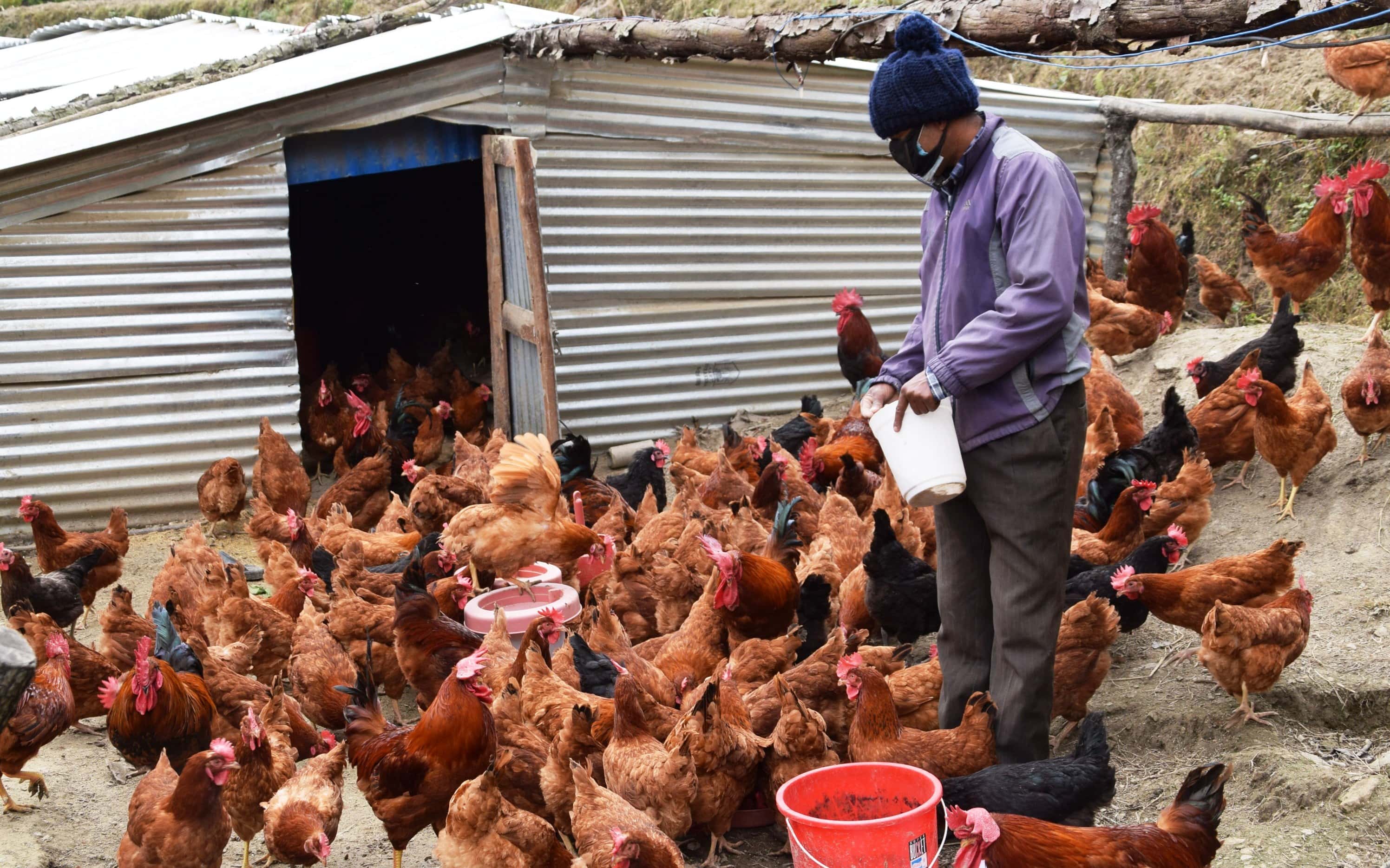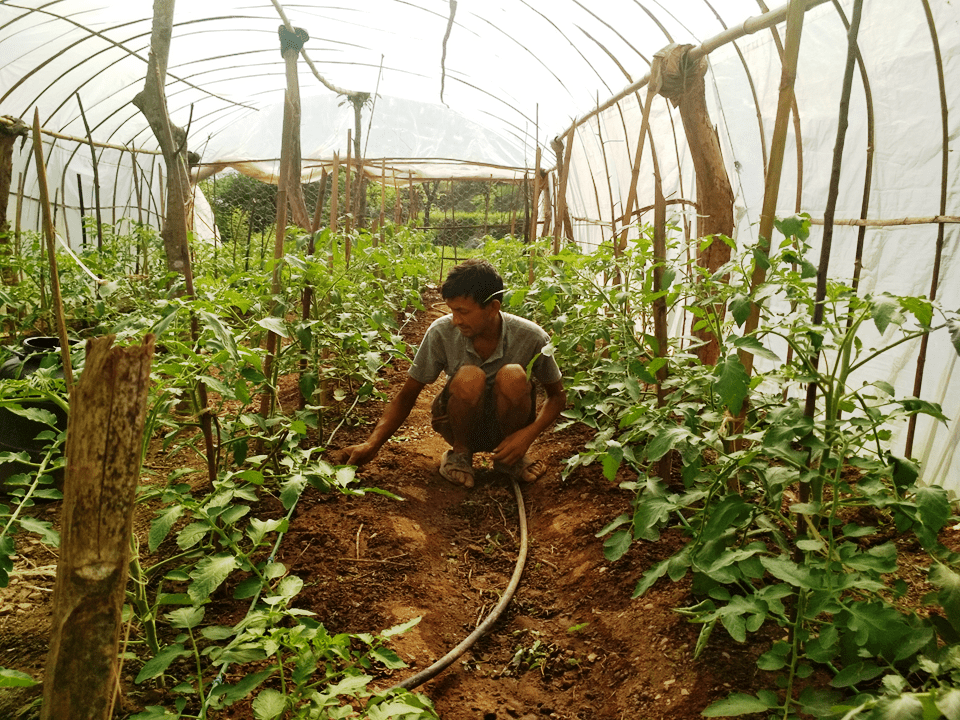Poultry, in particular, has risen to become the leader in the local farming industry in Bajhang, which has been depicted as a backward district. Poultry farming is championing the trend of making people of Thalara locals self-reliant.
Basant pratap singh: Centre for Investigative Journalism-Nepal

Poultry farm raised by Tikaram Joshi from Dandakhet, Lara rural municipality-6
Bajhang, a hilly district in the far-west, is often depicted as poverty-stricken and backward with people having discriminatory and superstitious mindset. Even now, Bajhang folks wash firewood collected from jungles before putting it on fire, substantiating their superstitious attitude. Even literate and intellectuals residing in district headquarters believe in Chaupadi, a tradition practice that banishes females during menstruation, untouchability and social anomalies.
Unfortunately, anyone who takes initiatives to discourage superstitions and other anomalies will be in boiling waters since local representatives, it appears, have surrendered to fallacies. However, people of Thalara village have initiated efforts to end the deep-rooted superstitions and discriminatory practices. A program initiated at the village level has brought about changes in the livelihood of quite a few families, who challenged the superstitions and moved headway by taking up entrepreneurship.
For instance, Tika Ram Joshi, a local Brahmin of Dandakhet, Thalara village municipality-6 got into poultry farming despite all odds. As a matter of fact, it was a Herculean task for a Brahmin like Joshi, whose family and relatives practice height of superstitious beliefs. He belonged to a family which sprinkled ‘holy’ water to family members before entering the house. Moreover, Brahmins of this district never ploughed their fields because of being criticized. Tika Ram, however, ploughed his fields two years ago. He also broke the practice of sprinkling ‘holy’ water. The height of criticism and mockery was so intense that his elderly family members even hesitated to drink water served by him. But he was not disheartened. Voices of dissent gradually weakened. Appreciating Tika Ram’s valor, Thalara Village Municipality then proposed him to start poultry farming to uplift is livelihood. This was, in fact, a milestone to break the deep-rooted superstitious beliefs.
“I was planning to start a business. Without giving a second thought, I agreed,” Tika Ram said. While the village municipality initially agreed to provide 400 hatchlings to him, Tika Ram agreed to make the coop. But since it involved around Rs 2 lakhs to construct the coop, he proposed local Laxmi Raj Joshi, who agreed for partnership. They constructed the coop, and purchased necessary equipment. However, involvement of Brahmins in poultry farming spread like wild fire in the village. Criticism, especially from the Brahmin communities, was at its height. “They slammed us a lot accusing us of disregarding our caste,” said Laxmi Raj Joshi.

Supported by village municipality, fish farming setup by Kusum Khadka from Thalara
This did not deter Tika Ram and Laxmi Raj. The business gave them an unexpected result. Currently, they have a total of 500 hens. By selling eggs, they have been making a profit of at least Rs. 50 thousand per month. “We sell at least 40 to 50 cocks per month,” said Laxmi Raj, adding, “The business is fairly satisfactory.” Influenced with the business, other Brahmins and Thakuris, who considered touching hens was disgraceful, too, got into this business. The village municipality has been providing 10 to 250 chicks to enthusiasts free of cost.
Says Sharmila Ojha, who started this business lately, “We have now realized that it was because of superstitions we were poor, backward.” In the last five months, she earned Rs 80 thousand by selling seven thousand eggs. “This business has made us self-reliant,” she asserts. According to Balmiki Prasad Joshi, chief of the Animal Service Division of Thalara Village Municipality, a total of 264 people in the municipality started poultry business within a year. “Some people, who feared of ‘tarnishing’ their image and caste have been earning Rs 2 to 3 thousand per day by selling eggs,” he informed. Joshi is hopeful that Thalara village municipality would soon become self-reliant in chickens and eggs in the next one year. While around 200 people have been selling both meat and eggs by farming ‘Layers’ hens, more than 50 have been farming broiler hens for meat. Poultry farms in Thalara produces at least three thousand eggs on a daily basis. The eggs are traded to district headquarters Chainpur and neighboring Durgathali, Kedarpur and other adjoining villages.
The village municipality has invested Rs 8 lakhs for buying hatchlings, providing training on poultry, and necessary medications to encourage people to start the business. Likewise, peasants have invested Rs 30 lakhs in coops and other equipment. Says Joshi, “Hens and eggs worth Rs 1 crore can be produced within this year.”
As an effort to expand the business, the Thalara village municipality is set to establish a hatchery to produce chicks in the village itself. Joshi informed that the village municipality has called for applications for business-sharing to invest in the shelter, coop and other initial investments for the same. The village municipality has also decided to provide Rs 5 lakhs in grant to purchase the hatchery machine.
Enthralled with the sea-change in is municipality, Bhuwaneswor Upadhyaya, Chairperson of the Thalara Village Municipality says, “The results have been dramatic. Even poor people have started making money.” Upadhyaya adds, “Moreover, there has been a gradual decline in the deep-rooted superstitious beliefs.”
Exemplary business in agriculture

Ananda Rokaya from Thalara Pikhet cultivating off-season vegetables.
After poultry, the Thalara Village Municipality is now gearing towards making the municipality self-reliant in agriculture-based products. In the last fiscal year, the municipality distributed 60 thousand saplings of cardamom, mango, lemon, lychee, among others to a total of 2,600 peasants. This year the municipality distributed 19,500 saplings of walnut, apple, peach, pear, and other fruits to around 1200 peasants, according to Agriculture Division Chief, Gorakh Raj Upadhyaya. He informed that the municipality has adopted a policy to extend technical and infrastructure support to peasants by designating pocket region to produce fruits.
The Thalara village municipality, which has collaborated with several NGOs to encourage farmers in producing vegetables, boasts of being self-reliant on productions like tomatoes, onions, potatoes, green leaves, among other vegetables. The produce of this village has been exported to neighboring districts.
After gaining knowledge about producing untimely (unseasonable) vegetables under the plastic tunnel from the municipality experts, Ananda Rokaya, a local of Pikhet, Thalara, earns around Rs 8 lakhs annually from vegetables. “It was because of lack of idea and skill we were poor,” said Rokaya, who a few years back was strolling in the Indian towns in search of a job. Now, he earns Rs 2 to 3 thousand a day.
Coordinator of Agriculture Committee ward no-4, Bishnu Bista informed that plans are afoot to set up a cold storage in Bagada of former Dangaji VDC to store vegetables.
According to Village Municipality Chairman Joshi, they are also planning to conduct a program to promote scented Hansaraj Basmati rice, which is produced in Bajhang district. According to him, the rice will then be sent to the market after completing necessary procedures like lab testing and packaging.
Chief of the Agriculture Information Center of Bajhang, Ram Lal Joshi informed that around 30 tons of potato produced in Bagada of Thalara village municipality have been exported to districts like Gulmi, Baglung and Myagdi for seed purpose. “Thalara has, in fact, made a lot of progress in terms of agriculture and livestock sector in a short span of time. Thalara can develop into a model village within a few years of people moved ahead with the same enthusiasm,” he said.



